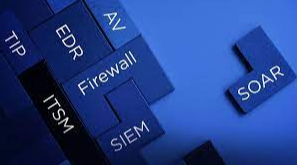Strong endpoint security is becoming an increasingly important component of any organization's cybersecurity strategy as remote work becomes more common in this digital era. It is crucial to deploy an effective EDR security solution to safeguard the enterprise and the remote working employee from cyber threats.
What is EDR in SOC? - Endpoint detection and response (EDR), also referred to as endpoint threat detection and response (ETDR), is a comprehensive endpoint security solution that incorporates continuous real-time monitoring and data collection with rules-based automated response and analysis abilities.
Anton Chuvakin of Gartner coined the term to describe emerging security systems that detect and investigate suspicious activity on hosts and endpoints, relying heavily on automation to enable security teams to identify and respond to threats quickly.
The primary functions are as follows:
- Monitor and collect endpoint activity data that could indicate a threat.
- Examine this data for threat patterns.
- Respond to identified threats automatically to eliminate or contain them and notify security personnel.
- Tools for forensics and analysis to examine identified threats and look for suspicious activity

The Importance of EDR in terms of what is EDR in SOC?
EDR is built to go beyond conventional, reactive cyber defense. Instead, it gives security analysts the tools they need to identify threats and protect the organization. EDR includes several features that improve an organization's ability to manage cybersecurity risk, including:
- Improved Visibility
- Rapid Investigations
- Remediation Automation
- Contextualized Threat Hunting
What is EDR in SOC? - EDR security solutions collect and analyze data continuously and report to a single, centralized system. From a single console, a security team has complete visibility into the state of the network's endpoints.
EDR solutions are built to automate data collection, processing, and response activities. This allows a security team to quickly gain context about a potential security incident and take remedial action.
Certain incident response activities can be carried out automatically by EDR solutions based on predefined rules. This allows them to prevent or quickly remediate specific incidents, reducing the burden on security analysts.
The continuous data collection and analysis provided by EDR solutions provide detailed visibility into an endpoint's status. This enables threat hunters to detect and investigate potential signs of an existing infection.
What is EDR in SOC? - Key components
EDR security functions as an integrated hub for collecting, correlating, and analyzing endpoint data and coordinating alerts and responses to immediate threats. EDR tools are made up of three essential components:
Endpoint data collection agents
Endpoint monitoring is performed by software agents, which collect data such as processes, connections, the volume of activity, and data transfers into a central database.
Automated response
An EDR solution's pre-configured rules can identify when incoming data shows a known security breach and generate an automatic response, like logging off the end-user or sending an alert to the staff.
Analysis and forensics
What is EDR in SOC - With it included? - An endpoint detection and response system may include real-time analytics for rapid detection of threats that do not best suit the pre-configured rules and forensics tools for threat hunting or post-mortem analysis of an attack.
- A real-time analytics engine scans for patterns by evaluating and correlating large amounts of data.
- Forensics tools allow IT security professionals to examine previous breaches to understand better how an exploit works and breaches security. IT security professionals also use forensics tools to search for threats in the system, like malware or other exploits that may be lurking undetected on an endpoint.
Conclusion on what is EDR in SOC - Why It Is More Crucial than Ever
Endpoint security has always been a crucial component of a company's cybersecurity strategy. While network-based defenses can prevent a high percentage of cyberattacks, some will get through, and others (such as malware on removable media) can bypass these defenses altogether. An endpoint-based defense solution allows a company to implement defense in depth and increase its chances of detecting and responding to threats.
However, as organizations increasingly support remote working, the impact of solid endpoint protection has resulted in drastic growth. Employees working from home may not be as well protected against cyber threats as on-site workers because they use personal devices or devices that do not have the latest updates and security patches. Additionally, employees who work in a more casual environment may be less concerned with cybersecurity.
These elements put the organization and its employees at risk of additional cybersecurity threats. Therefore, strong endpoint security is essential as it protects employees from infestation and prevents cybercriminals from using a teleworker's computer as a stepping stone to target the enterprise network.
Xcitium Advanced is a comprehensive Endpoint Detection and Response (EDR) bundle for businesses working in a new "work from home" reality with remote employees. It assists you in understanding threats and maturing your security program by ensuring that you know not only that an attack occurred and was virtualized and contained but also precisely what happened, where your vulnerability factors are, and how to prepare for future threats effectively.
Request a demo to get answers to what is EDR in SOC and see how Xcitium can help protect your remote workforce from cyber threats.
